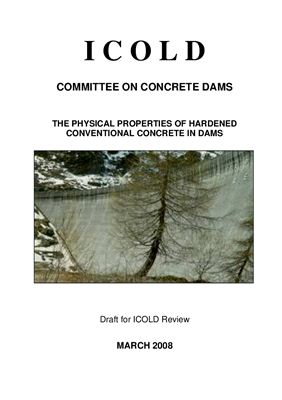Committee on Concrete Dams, 1991 - 2008, 262 pages
The purpose of this Bulletin (145) is to provide a comprehensive treatise on the physical properties of hardened conventional concrete for dams, refreshing the partial information contained in some out-of-date ICOLD Bulletins, giving ana account of new approaches and exaamining also some important properties not included in the previous Bulletins.
Sections
Committee on Concrete for Dams
Acknowledgements
Table of contents
Foreword
1. Introduction
1.1. Purpose of the Bulletin
1.2. Scope
1.3. Relationship to earlier Bulletins
1.4. Definitions
1.5. Content of the Bulletin
2. Strength properties
2.1. General
2.2. Concrete testing
2.3. Compressive strength
2.4. Tensile strength
2.5. Shear strength
2.6. Dynamic strength
2.7. References
3. Elastic properties
3.1. General
3.2. Static modulus of elasticity
3.3. Dynamic modulus of elasticity
3.4. Poisson's ratio
3.5. Significance of elastic properties on dam behaviour
3.6. Use of elastic properties in mathematical models for dam structural analysis
3.7. References
4. Creep properties
4.1. General
4.2. Factors influencing creep
4.3. Measurements of creep
4.4. Significance of creep properties on dam behaviour
4.5. Modelling creep in structural analysis
4.6. References
5. Shrinkage
5.1. General
5.2. Types of shrinkage
5.3. Causes and mechanism of drying shrinkage
5.4. Factors affecting drying shrinkage
5.5. Estimation of drying shrinkage
5.6. Effect of shrinkage on cracking
5.7. Effect of shrinkage on concrete dams
5.8. References
6. Thermal properties
6.1. General
6.2. Temperature rise of young concrete during the hydration of cementitious materials
6.3. Thermal conductivity of hardened concrete
6.4. Specific heat of harddened concrete
6.5. Thermal diffusivity of hardened concrete
6.6. Coefficient of thermal expansion of hardened concrete
6.7. In situ measurements of concrete temperatures
6.8. References
7. Water permeability
7.1. Introduction
7.2. Factors influencing the concrete water permeability
7.3. Test method for water permeability
7.4. Modelling ater permeability in saturated concrete
7.5. References
8. Frost resistance
8.1. General
8.2. Frost resistance, mechanism and effects
8.3. Factors affecting the frost resistance
8.4. Methods for experimental determination of the concrete frost resistance
8.5. Laboratory diagnostic investigations
8.6. Freezing and thawing on concrete dams
8.7. References
Appendices
A. Fracture energy: applications for dams
B. Physical properties of construction joints in dams
C. Physical properties of concrete subjected to expansion phenomena such as Aar in dams
The purpose of this Bulletin (145) is to provide a comprehensive treatise on the physical properties of hardened conventional concrete for dams, refreshing the partial information contained in some out-of-date ICOLD Bulletins, giving ana account of new approaches and exaamining also some important properties not included in the previous Bulletins.
Sections
Committee on Concrete for Dams
Acknowledgements
Table of contents
Foreword
1. Introduction
1.1. Purpose of the Bulletin
1.2. Scope
1.3. Relationship to earlier Bulletins
1.4. Definitions
1.5. Content of the Bulletin
2. Strength properties
2.1. General
2.2. Concrete testing
2.3. Compressive strength
2.4. Tensile strength
2.5. Shear strength
2.6. Dynamic strength
2.7. References
3. Elastic properties
3.1. General
3.2. Static modulus of elasticity
3.3. Dynamic modulus of elasticity
3.4. Poisson's ratio
3.5. Significance of elastic properties on dam behaviour
3.6. Use of elastic properties in mathematical models for dam structural analysis
3.7. References
4. Creep properties
4.1. General
4.2. Factors influencing creep
4.3. Measurements of creep
4.4. Significance of creep properties on dam behaviour
4.5. Modelling creep in structural analysis
4.6. References
5. Shrinkage
5.1. General
5.2. Types of shrinkage
5.3. Causes and mechanism of drying shrinkage
5.4. Factors affecting drying shrinkage
5.5. Estimation of drying shrinkage
5.6. Effect of shrinkage on cracking
5.7. Effect of shrinkage on concrete dams
5.8. References
6. Thermal properties
6.1. General
6.2. Temperature rise of young concrete during the hydration of cementitious materials
6.3. Thermal conductivity of hardened concrete
6.4. Specific heat of harddened concrete
6.5. Thermal diffusivity of hardened concrete
6.6. Coefficient of thermal expansion of hardened concrete
6.7. In situ measurements of concrete temperatures
6.8. References
7. Water permeability
7.1. Introduction
7.2. Factors influencing the concrete water permeability
7.3. Test method for water permeability
7.4. Modelling ater permeability in saturated concrete
7.5. References
8. Frost resistance
8.1. General
8.2. Frost resistance, mechanism and effects
8.3. Factors affecting the frost resistance
8.4. Methods for experimental determination of the concrete frost resistance
8.5. Laboratory diagnostic investigations
8.6. Freezing and thawing on concrete dams
8.7. References
Appendices
A. Fracture energy: applications for dams
B. Physical properties of construction joints in dams
C. Physical properties of concrete subjected to expansion phenomena such as Aar in dams

